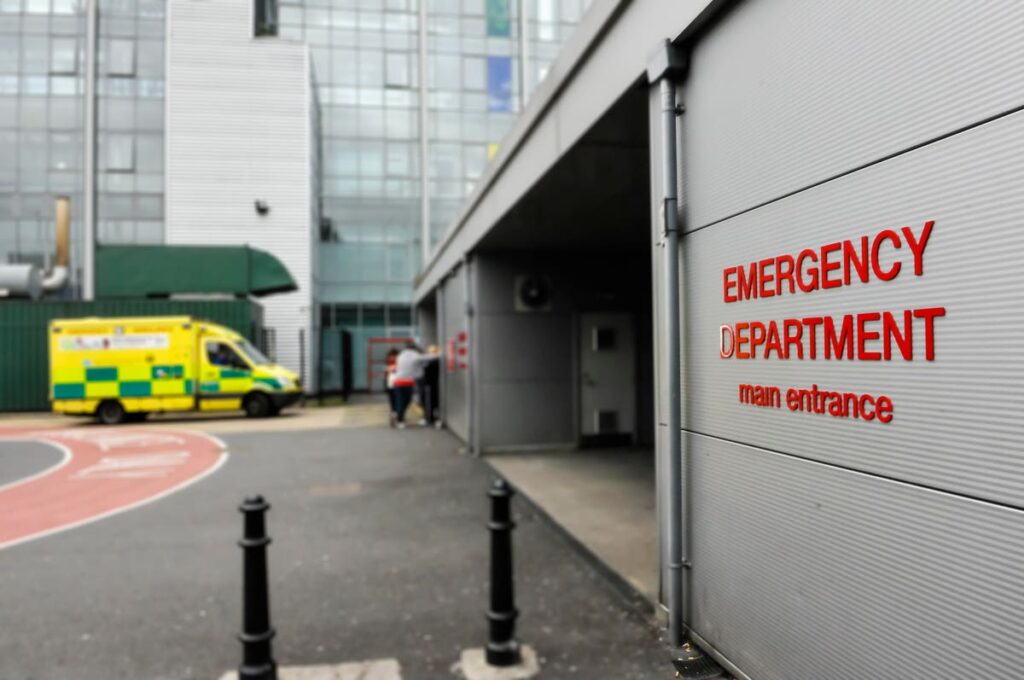Ambulance outside a hospital Accident and Emergency department.
The U.K. government is billions of pounds behind on money it promised to spend upgrading England’s hospitals, two separate investigations published this week show.
On Monday, the HSJ revealed that less than half of £2.7bn ($3.4bn) awarded to hospital trusts in England for projects in 2017 and 2018 had actually been spent.
And on Wednesday, the BBC reported that building had started on just seven of a promised 40 new hospitals projects announced in 2019.
Schemes on hold or scrapped
Five years ago, the U.K. government said it would spend billions on more than 140 hospital building projects in 2017 and 2018. The wide-ranging program would cover things like upgraded emergency departments and new primary care hubs.
But HSJ’s investigation showed just a fraction of these projects — 38% — had actually been completed with the promised funds. One had been finished with money from elsewhere, but many were either ‘on pause’ or had been scrapped altogether. The future of many remains uncertain.
The Department of Health and Social Care told HSJ that the schemes were not delayed as such, but that they couldn’t be funded without a centrally-approved business case.
Hospitals must develop their own building plans for the scheme, and many of these have still not been signed off.
A DHSC spokesperson told the outlet: “We are committed to all hospital upgrades we’ve previously announced where they continue to show benefit for patients, and currently there are 48 projects in construction with 29 due to begin construction in 2023-24.”
But Sarah Walter from industry group NHS Confederation criticised “over 10 years of underinvestment” in hospital buildings, which had been left to “crumble into a state of disrepair.”
“[HSJ’s] research highlights the problems leaders are facing in accessing capital funding and already agreed projects, this is leading to a domino effect of wider backlog of issues which are not funded yet,” she added.
‘40 new hospitals’
The BBC report shows a more recent — and arguably more famous — hospital building project has largely failed to get off the ground.
Back in 2019, then-prime minister Boris Johnson announced the government would build 40 new hospitals by 2030: an ambitious scheme that has been controversial for years.
Critics argue that many planned ‘new hospitals’ are really just rebuilds or extensions to existing hospital sites.
In February, The Guardian revealed just 10 of the projects had secured planning permission. Now, the BBC has shown construction has started on just seven.
Six hospital builds were originally expected to be finished by 2025. But, as the chief medical officer of one of these trusts said she now doesn’t expect it to be finished till at least 2027.
Epsom and St Helier University Hospitals NHS Trust, near London, has several major buildings issues that get in the way of everyday hospital activities.
Chief medical officer Ruth Charlton, who met a BBC reporter ouside of a condemned ward with “crumbling foundations” told the BBC: “I’m frustrated on behalf of our patients, their families or staff that they can’t receive healthcare in the sort of facility that I would want my family to receive healthcare in.”
Problems such as leaks and inappropriate building materials — including a type of concrete that’s left a handful hospitals at risk of collapse — mean care at many facilities faces regular interruption. The cost of maintainance at these hospitals has also risen considerably in recent years.
A Department of Health and Social Care official told the BBC: “We remain committed to delivering all 40 new hospitals by 2030 as part of the biggest hospital-building programme in a generation.”
Despite the scheme being announced four years ago, some of the 40 schemes are still to be confirmed as leaders mull over bids from several hospital trusts. And the longer it takes for funding to be allocated and delivered, the more expensive planned projects tend to get.
Industry groups have urged the government to make funding decisions quickly.
Sir Julian Hartley, chief executive of NHS Providers, which represents trusts, called on the government to provide clarity as soon as possible.
He told BBC Radio 4’s Today program that there was an “absolutely dire need for decisions to be made about making progress… and tackling in the longer term the ageing infrastructure” of the country’s hospitals.


